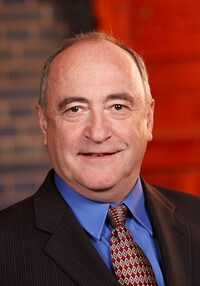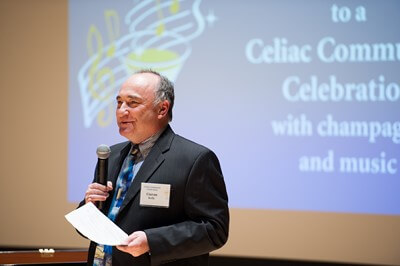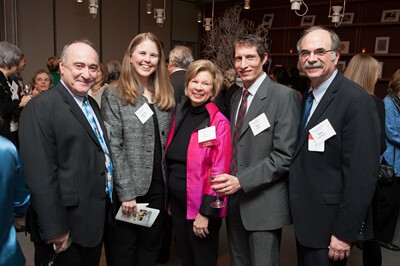New Beyond Celiac Board member brings experience in treatment, education and research
(First of a two-part series)
By Amy Ratner, Science and Medical News Analyst
 It’s the late 1980s. A young doctor comes to the United States from Ireland, where celiac disease is commonly diagnosed, and is told that there are no patients with celiac disease here.
It’s the late 1980s. A young doctor comes to the United States from Ireland, where celiac disease is commonly diagnosed, and is told that there are no patients with celiac disease here.
But the 35 years since have proven what he suspected all along – that patients with celiac disease were just being overlooked, and he could help them.
That’s the back story of Ciarán Kelly, a Boston-based physician and researcher, who recently joined the Beyond Celiac Board of Directors.
About 12 years ago, he opened the Celiac Center at Beth Israel Deaconess Medical Center (BIDMC), where he remains the director. More than 2,500 patients have been treated there for the genetic autoimmune disease in which the gluten protein in wheat, barley and rye triggers the body to attack itself. In 2013, it was one of three Boston celiac centers that joined forces to create the Harvard Medical School Celiac Research Program.
Dr. Kelly describes it as a story of growth, from the perception that there were “no people with celiac disease in Boston all the way to having a multi-institutional celiac program at Harvard.”
Although high school aptitude tests showed he should become an architect, Dr. Kelly wanted to be in a field where people would be at the core of his work. He chose to study medicine at one of the oldest medical schools in the world, Trinity College in his native Dublin. There he was mentored by Donald Weir, M.D., a renowned professor who focused on celiac disease research and vitamin B12 and folate deficiencies.
In his early years in Boston, Dr. Kelly turned his attention to intestinal infection and inflammation. He continues to lead National Institutes of Health (NIH) research on C. difficile infection. At the Celiac Center at BIDMC, he heads clinical, research and educational programs. He is a professor of medicine at Harvard Medical School and program director for gastroenterology fellowship training at BIDMC.
Dr. Kelly says his breadth of experience in celiac disease is what he hopes to bring to the Beyond Celiac Board and what is likely to benefit it most. He sees ways in which research into celiac disease can lead to wide-spread advancement in the treatment of autoimmune diseases. And he describes the patients who have participated in important, and sometimes challenging, celiac disease research studies as Marines for their courage and commitment.
He has a long association with Beyond Celiac, having served on the Scientific/Medical Advisory Council for many years. In fact, he connected the organization and Kristin Voorhees, who became Director of Healthcare Initiatives after she had worked at the BIDMC Celiac Center on physician education.
We sat down with Dr. Kelly to find out more about him and what he sees as the most exciting developments in the diagnosis, treatment and potential cure for celiac disease on the horizon.

Dr. Kelly speaks at an educational celiac disease event
I was born and raised in Dublin, Ireland. My mom was a housekeeper. My father was a tradesman, a plasterer. During my summer vacation I worked on the building sites with my dad, which I enjoyed. I got a nice tan, which isn’t easy to do in Ireland.
I went to medical school at Trinity College, and at the end of medical school I trained in internal medicine. During that time, I got to work with Dr. Weir, who had two interests research wise, and one was celiac disease. He was really the reason I went into gastroenterology. I continued to work with him, and I established a clinic in Dublin solely devoted to the care of patients with celiac disease.
The career prospects in Dublin at that time, June 1989, were bad so I decided that Boston would be a very good place to live and work. Many of my classmates were already there, in fact. When I sat down to chat with my new boss about what research I might do I said I had done a good deal of work in celiac disease. He said, “Well, you’re not going to be able to do that here because we don’t have any patients.” So I worked on other things up until about 2000, at which time it became increasingly obvious that there were a lot of patients with undiagnosed celiac disease in the United States.
I opened up shop again in celiac disease and shortly after that established the celiac center that has been going strong for 12 years. We’ve seen between 3,000 and 4,000 patients, and of those more than 2,500 were diagnosed with celiac disease.
More recently, Alessio Fasano, M.D. moved his Center for Celiac Research and Treatment to MassGeneral Hospital for Children. With that development, he, Alan Leichtner, M.D., Director of the Celiac Disease Program at Boston Children’s Hospital, and I joined forces to create the Harvard program in celiac disease research. Our combined efforts are now going into fostering and encouraging research and education in celiac disease.
My favorite thing about my job is that I get to do so many different things. In any given week, I typically have educational activities and some administrative responsibilities. I run two teaching programs. I absolutely see patients every week. I get to do endoscopic procedures, and then I get to do research in the time that’s left. It makes for an interesting week.

From left to right: Dr. Ciaran Kelly, Dascha Weir, MD, associate director of the
Celiac Disease Program at Boston Children’s Hospital, Lee Graham, executive director
of the New England Celiac Organization, Daniel Leffler, MD, medical director,
Takeda Pharmaceuticals USA, Inc., and Alan Leichter, MD, director of the
Celiac Disease Program at Boston Children’s Hospital
That’s a difficult question to answer because there are so many exciting things happening. I can break it down to the two or three most important things. The first is the increasing awareness of the disease and increasing access to gluten-free foods that are actually edible. That has been a change that I’ve seen during my time here in the United States. The second is the ease of diagnosis. We have very powerful blood tests that have made diagnosis and exclusion of celiac disease relatively simple and straightforward.
I think the third area, and the next major chapter is extremely exciting, and that is the development of safe and effective non-dietary treatments for celiac disease. That’s something that’s really only been considered for the past 10 years, and today it’s being seriously pursued. Now there are several large pharmaceutical research groups involved in developing agents for celiac disease of many different types; everything from conceptually straightforward approaches such as enzymes to break down gluten– to the less intuitive agents like Larazotide acetate, which improves tight junction function with the idea that it prevents gluten from penetrating the body.
More recently some very exciting immunologic approaches are being developed to try to reverse the intolerance to gluten that people with celiac disease exhibit; in other words, to re-educate their immune system so they no longer react to gluten as if it was a harmful virus. I’m hopeful that over the next 10 years I will see approved agents that will make life easier for patients with celiac disease. Ultimately, of course, the goal is to cure the disease and allow people to eat a normal diet and not to worry about being gluten-free. I think that is an achievable goal, but it’s going to take time, hard work and substantial resources.
Despite the ease of diagnosis, most people are never diagnosed. And even those who are diagnosed typically experience a long delay between the time they first come to the doctor and the time that the diagnosis is actually made. Although there is increased awareness there is still not sufficient awareness. It’s not unusual for the patient to be the one who has to say, “I should be tested for celiac disease.” Inadequate and slow diagnosis continues to be a problem.
Second, even though the gluten-free diet is safe it can be challenging to follow especially when people are eating outside of their own home. We did a study a couple years back looking at patients’ perception of their disease. We asked if they consider themselves to be healthy. Generally, people with celiac disease did consider themselves healthy. But when we asked about the burden of treatment, people with celiac disease perceived it to be higher than most of the other diseases that we studied. Higher than IBD, higher than hypertension, higher than heartburn, higher than irritable bowel syndrome and higher than congestive heart failure. In fact, the only disease that was considered by patients to be more burdensome to treat than celiac disease was renal failure on dialysis.
I understood there was a burden, but I’d underestimated how big the burden is. But the reason is simple — you don’t just have to take tablets three times a day to treat celiac disease. You have to think about it before and during every single meal. Whenever you are going anywhere you have to think, “Do I have to bring my own food? Where can I get food? Will the food be safe?” It’s a constant burden to negotiate life on a gluten-free diet.
The third challenge is assembling the resources to advance the field through innovative research. Celiac disease has been rather neglected as a research topic. We did a survey recently comparing NIH funding for celiac disease to NIH funding for IBD, and it was a depressing comparison; there is more than 10 times more funding for IBD than for celiac disease research. In the pharmaceutical industry, research and development resources for celiac disease up until 10 years ago, were essentially zero. It’s only now that companies are beginning to devote resources, because they are beginning to see that it’s a very common disorder, it’s lifelong and yet it has been neglected for a long time.
I think we’d like to address all of them. One of the facets of my interest in celiac disease that I value the most is that it’s very broad. It’s everything from helping with the diagnosis and management to developing research tools for the community to working with the pharmaceutical industry on drug development.
The breadth of my interest is what keeps me working in all those areas continuously. I look forward to bringing this to the Board.
I would say establishment of our celiac center would be a high point, though it was actually very low key when it happened with no press release or fanfare. Looking back, I can see that we’ve been able to support and assist so many people with the disease, particularly at a time when good care for celiac disease was very difficult to find. It’s probably the contribution that I’d be most proud of.
My favorite thing is racket ball or tennis depending on the season. I also enjoy cycling. I would love to try riding a Harley-Davidson, but I haven’t built up the courage to do it yet. It’s on my to-do list.
I guess they should know that I’m deeply committed to the disease at multiple levels. I’ve worked in celiac disease since the early 1980s, so I guess I’m not going anywhere at this point; the marriage is happy and secure.
You can broaden your understanding of what’s going on in celiac disease management and treatment by signing up for our Research Opt-In here.
Opt-in to stay up-to-date on the latest news.
Yes, I want to advance research No, I'd prefer not to